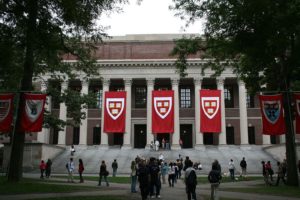Russian Research Center: Sic transit gloria mundi!

From: Boyle, Francis A
Sent: Sunday, March 12, 2023
To: Rosenberg, John S. <john_rosenberg@harvard.edu>
Subject: Russian Research Center: Sic transit gloria mundi!
It’s pretty pathetic! I learned all about Kievan Rus from my Teacher, Mentor and Friend, Ned Keenan, later RRC Director and then GSAS Dean. Ned helped me get my job as a law professor. RIP. Sic transit gloria mundi! fab, GSAS AM & PHD.
The arguably most important academic center for the promotion of NATO and the Zelensky regime, however, is Harvard University. The flag ship Ivy League school boasts an endowment of $53 billion and hosts the Davis Center for Russian Research, which has played a central role in the elaboration of US analyses and ideology with regard to the Soviet Union since the early days of the Cold War.
Harvard is also home to the Ukrainian Research Institute (HURI), which has close ties to and receives funding from the right-wing Ukrainian diaspora in the US and Canada. It is by far the biggest research institution on Ukraine in the US, if not the world, with an extraordinary 184 fellows, 31 associates and 27 fields of study.
Over the past year, both the Davis Center and HURI have held a dizzying number of events on the war, including one with President Volodymyr Zelensky that was moderated by former U.S. Secretary of Defense and Belfer Center Director Ash Carter. Other events featured Alexander Vindman and Klaus Welle, the current Secretary General of the European Parliament who for several decades has played an important role in the elaboration of German foreign policy.
For the anniversary of the war in February, the Ukrainian Research Institute and the Davis Center co-organized a conference entitled “Rebuilding Ukraine, Rebuilding the World” that was dominated entirely by think tank and policy figures from NATO, the IMF and the Ukrainian government. Among them were the former foreign minister of Ukraine, Pavlo Klimkin, and John Herbst, who served as US ambassador to Ukraine during the US-backed “Orange Revolution” in 2004. Klimkin now works for the rabidly anti-Russian and NATO-affiliated Atlantic Council.
In the opening panel, Joachim von Puttkamer, a historian at the Friedrich Schiller University in Jena, Germany, openly acknowledged, “All our thinking circles around scenarios which imply a regime change in Russia.” A closer look at Puttkamer’s co-panelists gives a sense of what this “regime change in Russia” would entail. One of Puttkamer’s co-panelists was Kateryna Shynkaruk, a lecturer at the Bush School of Government and Public Service, who used to work for the State Department on Ukraine policy. On the panel, she vehemently insisted that there could be no negotiated settlement with Putin.
On her social media, Shynkaruk has openly endorsed the apparent plans by the Ukrainian state to use the war to further the carve-up the Russian Federation in its existing form. In one Facebook post, she photoshopped an image to show the head of Ukraine’s armed forces, Valeriy Zaluzhnyi, an avowed admirer of the Ukrainian Nazi collaborator Stepan Bandera, beneath a map of a carved-up Russia. The map was found last December by journalists in the office of the head of Ukraine’s military intelligence, Kyrylo Budanov. It shows the Russian Federation divided up between an enlarged Ukraine, which would take large portions of the Caucasus, and an enlarged Germany, France, China and Japan. Only a small portion of what is now the Russian Federation would remain as “Russia,” and a whole new Central Asian republic covering largely what are now the Urals region in Siberia would be formed. When Budanov was asked by journalists whether this map showed his goals in the war, he cynically replied, “Everyone sees in it what they want to see in it. Perhaps this is just a broad marker. But perhaps it is more than that.”
Harvard’s Davis Center, along with Berkeley, the University of Michigan, the University of Texas Austin and a number of other leading US institutions, also co-sponsors a series called “Decolonization in Focus,” in which panelists discuss “Decolonizing Russian & Eurasian Studies.” The real political purpose of this series, which was coded in postmodernist jargon, was revealed in one its latest installments on March 3, “Impact beyond the Ivory Tower.” The Zoom event featured Erica Marat, who reported gloatingly on growing anti-Russian nationalist (“decolonizing”) sentiments in layers of the Kazakh population. Another speaker was Fatima Tlis, who railed against the “Russian” and “Soviet empire” both of which had supposedly perpetrated genocidal policies against the Circassians, a minority population from the Caucasus.
Both Marat and Tlis have ties to the military and the CIA. Marat works at the National Defense University in Washington D.C., an academic institution funded by the US Department of Defense. Tlis has worked as a journalist exclusively for outlets that are funded in whole or in part by the US government, such as Voice of America and Radio Free Europe/Liberty. Last June, they also participated in a webinar hosted for the US Congress under the title “Decolonizing Russia.” The webinar falsely portrayed Russia as a colonial empire whose disintegration through the promotion by Washington of nationalist and separatist tendencies within the Russian Federation would supposedly constitute a progressive development. When the moderator of that event asked, “Is decolonizing breaking up Russia? And if so, are there any risks associated with that?” none of the panelists would give a clear answer because the only honest answer was, of course: Yes.
Francis A. Boyle
Law Building
504 E. Pennsylvania Ave.
Champaign IL 61820 USA
